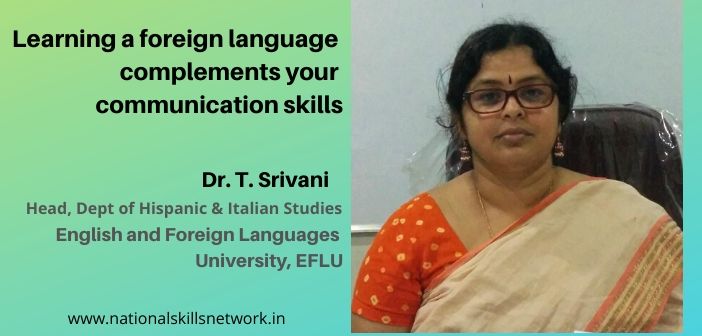“If you talk to a man in a language he understands, that goes to his head. If you talk to him in his language, that goes to his heart.” Nelson Mandela
A language is the most useful tool for communication among human beings. By virtue of being Indians we acquire more than one language since our childhood: our mother tongue, Hindi and English. English, of course predominantly is the medium of instruction all through our formal education and thus we acquire linguistic competency in English.
Besides English, foreign language teaching and learning has always been an integral part of the curriculum in India. French language, due its colonies in India has always been one of the foreign languages being offered in schools and colleges for the past 50-60 years. Russian was also an important language for us because of the strong Indo-Russian ties we enjoyed in the nineteenth and the twentieth century. The third foreign language that was promoted in India was German. Several institutes named after the German philologist and orientalist, Max Mueller offered German proficiency courses in major cities of India. Apart from these three languages, Arabic, too was being offered in our academia since there were many job opportunities for Indians in the Arabic world.
The importance of learning a foreign language
Globalization and liberalization policies that were introduced in the 90s, brought a sea change with respect to economic policies which required competency in major international languages. Thereafter foreign language teaching and learning have gained a lot of importance and many universities started offering other Asian languages like Japanese and Chinese along with the European Languages.
The proficiency courses in these foreign languages mainly focused all through on the cultural and linguistic competencies. These courses were designed keeping in view of situations one can come across while visiting the respective countries for example, France or other Francophone countries or any interaction with a foreign national during their visit to India. These proficiency courses also gave a lot of cultural and literary inputs and the learner would get sufficient competency of the cultural ethos along with linguistic competency. There were scholarships which promoted scholars to visit European countries for higher studies and learning foreign languages was a great advantage.
 Need for skilled professionals in foreign languages
Need for skilled professionals in foreign languages
The beginning of the twenty first century has brought in many changes in the foreign language curriculum along with technological advancements. The Central Universities that were offering foreign languages through part time mode, started offering B. A (Hons) programs in all these languages to cater to market needs. Most of the multinational companies need Foreign language resources for their projects. There is still a demand of several hundreds of language resources and an acute shortage that the academia needs to supply for the market needs.
Keeping in view of the requirement of skilled personnel and also as per the guidelines of the University Grants commission, the universities have designed their B.A F L programs offering skill based courses: courses for tourism, for business, for pharma industry, for literary translation etc. A student who is pursuing any other discipline also has acquired linguistic skills in any foreign language has n edge over other students during placements. A career is foreign languages is not only lucrative but also opens his vistas to a new world.
There are certainly umpteen opportunities for students learning foreign languages and the future for such language resources is quite optimistic.
As per the guidelines of the UGC, the courses in foreign languages across the country are being offered as Part-Time Courses with a total duration of 150-180 hours per course and the courses are: Certificate of Proficiency, Diploma and Advance Diploma in a particular foreign language. After the completion of an Advance Diploma in a language, along with a Bachelors Degree, a student can pursue a Masters degree in that particular foreign language. Apart from the option of learning it part-time, the foreign language courses can also be studied as a regular B.A.(Hons) and further, an M.A and a Ph.D.
The important universities that offer these foreign languages are: Jawaharlal Nehru University, New Delhi, Delhi University, New Delhi, The English and Foreign Languages University, Hyderabad, Ranade Institute, Pune, Bangalore University, Doon University,
Apart from these Central and State Universities, the proficiency courses are also offered by the Embassies of those countries or the Cultural Centres of those countries which are located in different parts of India.
These courses are also being offered through MOOC on the SWAYAM platform of the Government of India.
The objective of Swayam is to facilitate learning and take it to the doorstep of the disadvantaged and bridge the linguistic gaps. The learners have an array of Apps and ways to acquire communication skills in foreign languages.












